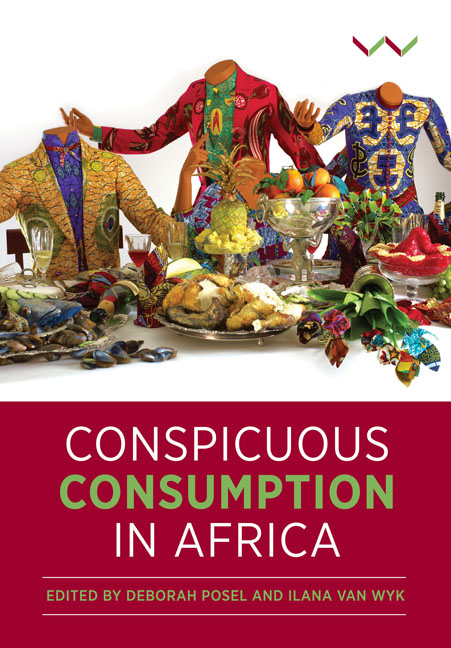Book contents
- Frontmatter
- Contents
- Acknowledgements
- List of Illustrations
- 1 Thinking With Veblen: Case Studies From Africa's Past and Present
- 2 Changes in the Order of Things: Department Stores and the Making of Modern Cape Town
- 3 Conspicuously Public: Gendered Histories of Sartorial and Social Success in Urban Togo
- 4 Etienne Rousseau, Broedertwis and the Politics of Consumption Within Afrikanerdom
- 5 Recycling Consumption: Political Power and Elite Wealth in Angola
- 6 Chiluba's Trunks: Consumption, Excess and the Body Politic in Zambia
- 7 Jacob Zuma's Shamelessness: Conspicuous Consumption, Politics and Religion
- 8 Precarious ‘Bigness’: a ‘Big Man’, His Women and His Funeral in Cameroon
- 9 Young Men of Leisure? Youth, Conspicuous Consumption and the Performativity of Dress in Niger
- 10 Booty on Fire: Looking at Izikhothane With Thorstein Veblen
- 11 Conspicuous Queer Consumption: Emulation and Honour in the Pink Map
- 12 The Politics and Moral Economy of Middle-Class Consumption in South Africa
- 13 Marigold Beads: Who Needs Diamonds?!
- Contributors
- Index
6 - Chiluba's Trunks: Consumption, Excess and the Body Politic in Zambia
Published online by Cambridge University Press: 29 October 2019
- Frontmatter
- Contents
- Acknowledgements
- List of Illustrations
- 1 Thinking With Veblen: Case Studies From Africa's Past and Present
- 2 Changes in the Order of Things: Department Stores and the Making of Modern Cape Town
- 3 Conspicuously Public: Gendered Histories of Sartorial and Social Success in Urban Togo
- 4 Etienne Rousseau, Broedertwis and the Politics of Consumption Within Afrikanerdom
- 5 Recycling Consumption: Political Power and Elite Wealth in Angola
- 6 Chiluba's Trunks: Consumption, Excess and the Body Politic in Zambia
- 7 Jacob Zuma's Shamelessness: Conspicuous Consumption, Politics and Religion
- 8 Precarious ‘Bigness’: a ‘Big Man’, His Women and His Funeral in Cameroon
- 9 Young Men of Leisure? Youth, Conspicuous Consumption and the Performativity of Dress in Niger
- 10 Booty on Fire: Looking at Izikhothane With Thorstein Veblen
- 11 Conspicuous Queer Consumption: Emulation and Honour in the Pink Map
- 12 The Politics and Moral Economy of Middle-Class Consumption in South Africa
- 13 Marigold Beads: Who Needs Diamonds?!
- Contributors
- Index
Summary
By the time of his indictment for corruption, former second republican president Frederick Chiluba of Zambia was already well known for being a great dresser. In one of the first internal criminal trials of an African leader for corrupt activity, the legal prosecution (2003–2009) was followed closely both locally and abroad. While the legal proceedings in Zambia dragged on, a special task force was established to investigate the allegations. When, in 2005, several metal trunks and suitcases were discovered in a warehouse in Lusaka, the capital, revelations about the former president's stunning wardrobe attracted sensationalist attention. Commenting on the revelation of the contents of his stored trunks, Chiluba said, ‘Old pictures are there, so you can see how I used to dress … I was one of the sweetest guys on the street, an entertainer, a politician, a unionist, a man of God. Amen’ (The Post 2005b). The revelations proved to be a turning point on which Chiluba's fondness for spectacular dress morphed into his stored wardrobe and in turn became emblematic of corruption. Consider the newsin- brief section in The New York Times on 15 March 2005, which, drawing on Reuters, reported the following:
ZAMBIA: INVESTIGATORS SEIZE EX-PRESIDENT's SHOES
Former President Frederick Chiluba reacted angrily to the seizure of his warehoused wardrobe by investigators, including 100 pairs of shoes, 300 shirts and 150 suits. He said it was meant to embarrass him, but investigators said they wanted to show how he abused his office during his 10-year rule, which ended in 2002. He was charged with corruption in 2003, but has been free on bail. ‘What they have done is to bring my underpants out to the general public,’ Mr. Chiluba said. ‘It is sad that the fight against corruption is being reduced to discussing suits, ties and shoes. Zambians know me and know that I have always dressed very well from the 1960s.’ (The New York Times 2005: A8)
To be sure, corruption and ostentatious consumption offer juicy news copy and provide dramatic accounts of the lavish lifestyles of former powerful leaders who have fallen from grace. Among the most obvious examples are Mobutu Sese Seko of Zaire (Wrong 2000: 211–231), Jean-Bédel Bokassa of the Central African Republic (Titley 2002), and Omar Bongo of Gabon (Ngolet 2000).
- Type
- Chapter
- Information
- Conspicuous Consumption in Africa , pp. 96 - 111Publisher: Wits University PressPrint publication year: 2019



